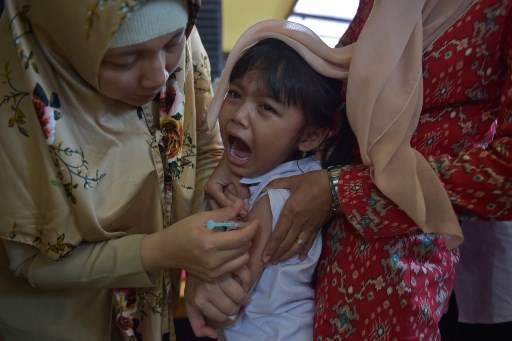The Indonesian government’s current nationwide drive to administer the measles-rubella (MR) vaccine to 32 million children has hit major obstacles due to fear among Muslim parents that the vaccine contains “haram” ingredients, leading officials to warn of a possibly devastating MR epidemic on the horizon.
The part of the country most at risk is the ultra-conservative province of Aceh, where only 7% of the children targeted by the vaccination drive have been immunized. Despite dire predictions from doctors who say the region could face an “MR tsunami” (a particularly loaded term for Aceh), the province’s acting governor said he would continue to delay the program until their own local Islamic clerical body, the Ulama Consultative Assembly of Aceh (MPU), issued a ruling on the MR vaccine.
In early August, acting governor Nova Iriansyah (who took over the role after former governor Irwandi Yusuf was arrested on corruption charges in July) had announced that he would delay his province’s implementation of the MR vaccine program until the Indonesian Ulema Council (MUI) issued a fatwa (religious edict) on whether the vaccine was halal or not.
MUI stoked already existing anti-vaccine paranoia with their demands to test the government’s MR vaccine at the outset of the immunization program and their recommendations to followers to wait for their ruling. Finally, after testing a sample, MUI published a fatwa on August 20 saying that while the vaccine did contain trace pig enzymes (in the gelatin used to stabilize the serum) it was acceptable for Muslims to take it given the lack of a halal alternative and the seriousness of the medical situation.
Despite his previous statement, Nova is now saying that MUI’s fatwa is not enough for Aceh and he is currently waiting for a fatwa from MPU saying the vaccine was acceptable before ordering the program restarted.
Responding to the “MR tsunami” warning from earlier this week, Nova issued a statement via government spokesperson Wiratmadinata on Wednesday saying the government could not restart the program without MPU’s say so.
“In connection with various information regarding the implementation of the MR vaccine in Aceh, the program cannot be implemented due to an absence of a fatwa from MPU. Even though there is already a ‘green light’ from the Central MUI, the Aceh Government is currently in the position of waiting for a recommendation or fatwa from the Aceh MPU,” Wiratmadinata said as quoted by Aceh Trend.
The government spokesperson went on to say that Aceh Health Services had sent a letter to MPU on September 5 asking whether the MR vaccine program could be re-implemented but had yet to receive a response.
Although MUI is Indonesia’s highest Islamic clerical body, its rulings are not legally binding nor are they given equal weight by all Muslim in Indonesia. The ultra-conservative MPU is considered to hold greater sway than MUI in Aceh, the only province in Indonesia with the power to implement sharia-based law.
We couldn’t find any statements from MPU regarding when they would issue their own fatwa on the vaccine but the lives of Aceh children seem to rest largely in their hands — although the central government said it was pushing for Aceh to implement the immunization program immediately, there appears to be little they can do to force the matter. The health ministry said they would extend the timetable for the program and had revised its estimates for the province to reach 20% of their target for the end of the year.
The effects of a measles-rubella outbreak are potentially devastating, as the disease can cause serious health complications including death in children. Pregnant women who contract the disease are also at risk of having their fetuses develop congenital birth defects.





Reader Interactions